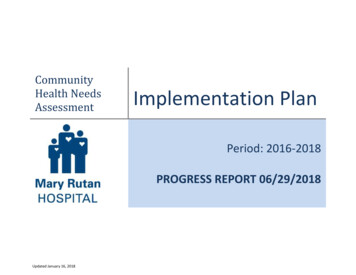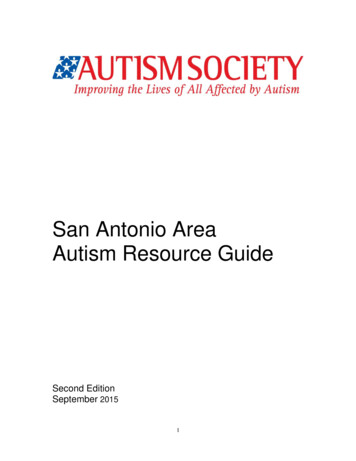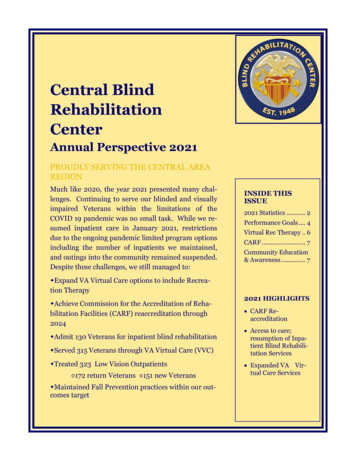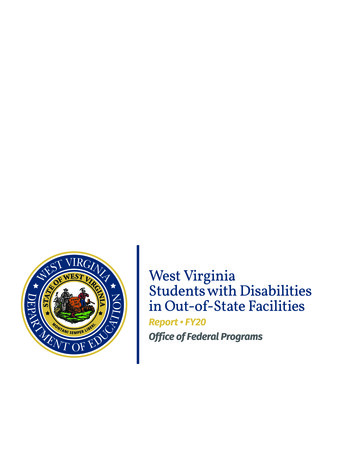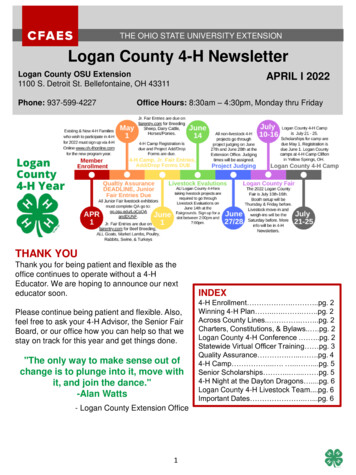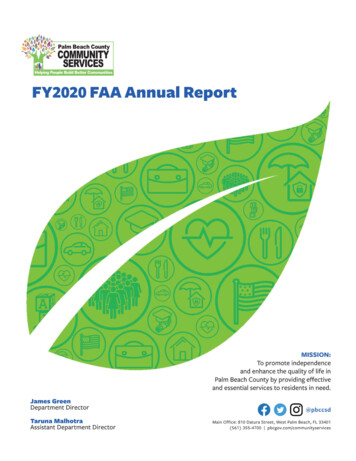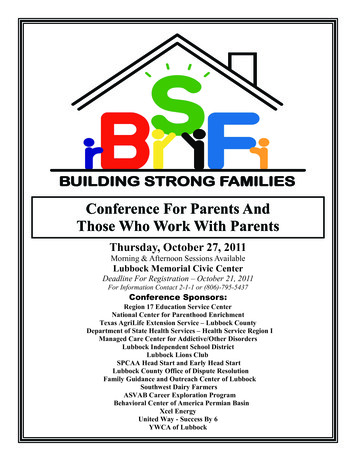
Transcription
PARENTS ASSOCIATIONBELLEFONTAINE HABILITATION CENTER10695 BELLEFONTAINE ROADST. LOUIS, MO 63137PHONE 314-340-6002WEBSITE www.parentsassociationbhc.comNEWSLETTERAUGUST 2014PARENTS ASSOCIATION MEETINGSUNDAY, AUGUST 10, 2014 2:00 p.m.GYM IN THE MULTIPURPOSE BUILDING, BHCAll Parent Association members, friends and staff are invited. Keep up with the latest news about BellefontaineHabilitation Center. Bring your talents and expertise for our advocacy efforts. With everyone’s involvement,the lives of the residents at BHC will be the best possible. All are encouraged to stay informed and take someaction. Attend a parents meeting, talk with other families, share your concerns and ideas, write a letter, or makea phone call to help provide a safe, healthy, and supportive environment for the residents of BHC and others.They have no voice but ours, so we must continually speak up for them.UPCOMING PARENT MEETING:SUNDAY AUGUST 102:00 P.M. in the gym2014 PARENT ASSOCIATION MEETING DATES: MARK YOUR CALENDARS!!AUGUST 10NOVEMBER 9The paper issue of the May 2014 of the Parents Association newsletter was not printed due to printerdifficulties. The May 2014 issue is online, but this August 2014 issue will repeat some of what was in the May2014 issue.Our Parent Newsletter is online at www.parentsassociationbhc.com. Pass it along to friends, family, andpolitical leaders.The new switchboard telephone number for Bellefontaine Habilitation Center is 314-264-9101.Valerie Huhn has been hired as the new Director of the Division of Developmental Disabilities. Herofficial start date in that position is September 1, 2014. As the Assistant Budget Director in the Office ofPlanning and Budget she has assisted in developing annual budget requests submitted to Governors’ Officesand to the Legislature, including program funding for the Division of Developmental Disabilities. Ms. Huhn hasa bachelors’ degree from Culver-Stockton College in Business Administration and History/Political Science anda masters’ degree in Public Administration from the University of Illinois-Springfield.The interim director until that date is Jeff Grosvenor. The previous Director of the Division of DevelopmentalDisabilities, Bernard Simons, retired as of March 15, 2014 after more than seven years in that position. He hasassumed the same position in Maryland beginning April 2014.Federal surveyors were on the BHC campus from 6/2/14 through 6/19/14. These annual surveys arerequired by federal Medicaid law to maintain Medicaid funding for the residents of BHC. There were nomedical errors and no active treatment errors cited.Staff members have been trained to cook meals in the homes, and are doing a good job of preparing themeals according to the specific needs of each resident. This is occurring because the dietary building will berazed sometime in the near future.A legislative update includes House Bill 1064 sponsored by Representative Jeff Grisamore. This billremoves all references of the phrases "mentally retarded" and "mental retardation" from Missouri statutes andreplaces them with" intellectually disabled" and "intellectual disability." The 2010 federal Rosa’s Law requiresall federal laws to use "intellectual disability", and the May 2013 Diagnostic and Statistical Manual of MentalDisorders, 5th edition (DSM-5) has changed “mental retardation” diagnosis to "intellectual disability."The BHC Parents Association cautions that families and legislators will have to keep a close watch in thefuture to make sure the change in language on the federal and state level does not affect funding or servicesfor those with the previous diagnosis of mental retardation.Keep informed. Take action.Mary A. Vitale, President, Bellefontaine Parents AssociationAUGUST 2014PAGE 2TRIBUTE FUNDCelebrate a birthday or anniversary, offer get well wishes or congratulations, remember a loved one by sendingin a tribute - support the residents at Bellefontaine Habilitation Center. A few examples of the use of funds are:
annual picnic, Christmas gifts and decorations, birthday cakes and presents, holiday decorations, treats anddances, household items, and special programs. The tribute form is on the last page of the newsletter.DONORMickey SlawsonStephen & Mary VitaleDr. and Mrs. Mark AkersRECIPIENTSarah Jane MaySarah Jane MayOCCASIONin memory of Bill Mayin memory of Bill Mayin honor of BHC residentsSincere condolences for the May family upon the death of Bill May, long-timeBHC board member. His generosity, faithfulness, and hard work made happier lives forall the residents of BHC. FUNDS APPROVED BY PARENTS ASSOCIATION BOARD 2140.00 9000.00 690.00 300.00 300.00 200.00Personalize birthday cakes for each resident for 201BHC Annual PicnicBirthday gifts Jul-Dec 2014Valentine candyEaster candyHome 1505 household ***********************************EMPLOYEE RECOGNITION LUNCHEON“Be Happy, Don’t Worry” was the theme for the Employee Recognition Luncheon held on July 24, 2014 at theCatering to You Banquet Center. Staff members with 5,10,15,20, and 20 years of service with theDepartment of Mental Health were each given recognition for their many years of work of providing appropriateservices for our family members who need so much assistance. Thanks to the Employee RecognitionCommittee for the time and effort spent to organize this event of staff appreciation filled with fun, food, andrelaxation.ANNUAL PICNIC FOR BHC RESIDENTSThe Bellefontaine Habilitation Center Annual Picnic sponsored by the Parents Association will be heldWednesday September 10 for Unit 1, and Thursday September 11 for Unit 3, 1:00 – 4:00 p.m. The theme thisyear is “Celebrate St. Louis.” Thanks to the staff who are preparing a fun day for BHC residents.The picnic is limited to parents, guardians, residents and current staff members.AUGUST 2014PAGE 3FINAL REPORT TO MENTAL HEALTH COMMISSION CONCERNING MARSHALL AND HIGGINSVILLEHABILITATION CENTERS http://dmh.mo.gov/news/2014NewsReleases.htm (excerpts)[July 10, 2014] The Missouri Mental Health Commission (MHC) received the final report and recommendationsfrom the Northwest Habilitation Services Task Force at its monthly meeting today. The Task Force wasestablished by the MHC in September 2013 and charged to recommend a redesign that would best meet the
needs of individuals served and would optimize the use of all available resources. The MHC requested thereport and proposal from the Task Force no later than August 2014.The MHC also proposed the Task Force be comprised of family members/guardians of the individuals nowserved by the habilitation centers, managers, support staff and direct care staff from the two programs, alongwith local government representatives of the two communities. After careful examination of the information collected and presented during the tenure of the Task Force, andconsideration of all options, the following recommendations were submitted: There should be one Habilitation Center Campus in the Northwest Region and it should continue to beICF/IDD certified. It is recommended this be HHC and be operated through the HHC Superintendent. An eight-person intensive behavior support crisis program should be developed in Marshall. The Marshall off-campus waiver program and the Higginsville off-campus waiver program shouldbecome one entity, known as Northwest Community Services, and should be operated through theMHC Superintendent. All individuals should continue to have the opportunity to choose day program and/or work skillsprograms through NWCS and HHC. All redirected resources should be used directly for the betterment of the DD services in thecommunities of Marshall and Higginsville, as opposed to addressing budget cuts or meeting unrelatedneeds across the state. Administrative and Support Services such as Accounting, Personnel, Staff Development, etc. should beshared between sites, as appropriate. Satellite offices should exist at each location under the oversightof one department head, as appropriate. Each employee whose position is affected by the changes should be offered a position to eport.pdfBHC PARENT ASSOCIATION COMMENTWhat happens in one part of the state affects all of our family members, so it is important to stay in contact withfamilies statewide, and statewide issues. Keep **********************BUDGET CUTS HURT DEPARTMENT OF MENTAL o overcome FY 2015 budget shortfalls, DMH will reduce its state General Revenue spending by approximately 34million. Some consequences of these cuts are:**Because of the budget cuts, DMH will transfer the management of six Department of Developmental Disability RegionalOffices in Albany, Hannibal, Joplin, Kirksville, Poplar Bluff and Rolla to the remaining Regional Offices, totaling 1,506,690.**The remaining offices are: Central Missouri Regional Office, Kansas City Regional Office, Sikeston Regional Office,Springfield Regional Office, and St. Louis Regional Offices. The regional offices, the primary points of entry into thesystem, provide assessment and case management services, which include coordination of each Individual Support Plan.**Also, DMH will phase-down and close the state-operated Cottonwood Residential Treatment Center effective January 1,2015. Cottonwood now provides residential services for children with mental health problems. The reduction totals 482,808.With the budget cuts there will a total reduction of 157.17 DMH state employees. For a complete list of cuts, go T 2014PAGE 4MAINTAIN A FULL CONTINUUM OF CARE, INCLUDING HABILITATION CENTER HOMESThe BHC Parents Association, other Missouri family organizations, and families nationwide continue to focuson maintaining a full continuum of care for persons with intellectual disabilities, including habilitation centerhomes. At the federal level habilitation centers are referred to as intermediate care facilities for individuals withintellectual disabilities (ICF/IID).In recent years, the BHC Parents Association gathered signatures from around the state of Missouri in supportof maintaining habilitation centers for long term care for individuals who need this level of care.Clearly, there is much support to open up long term admissions to habilitation centers.The Missouri cities represented include:AdrianBallwinBellefontaine NeighborsBlue SpringsCape GirardeauGravois arPevelyPlattsburgRaymoreRaytown
woodCreve ssantForistellGladstoneIndependenceJenningsKansas CityKirksvilleLake SherwoodLake St. LouisLake WinnebagoLees SummitLexingtonManchesterMoscow MillsMountain ViewOak lleSt. AnnSt. CharlesSt. LouisSt. PetersSpringfieldTroyWarrensburgWashingtonWebster GrovesWentzvilleWildwoodWinfieldThe freeze on long term admissions to Missouri habilitation centers is denying familiesthis choice as required by federal and state law. Habilitation centers do get inquiriesabout services but are referred to the regional offices to be guided into communityplacements only.The Code of Federal Regulations states:441.302 42 CFR Ch. IV (10–1–08 Edition)(d) Alternatives—Assurance that when a recipient is determined to be likely to require the level of careprovided in a hospital, NF, or an ICF/IID , the recipient or his or her legal representativewill be (1) Informed of any feasible alternatives available under the waiver; and(2) given the choice of either institutional or home and community-based services.June 1999 Olmstead decision by the Supreme Court states “This Court emphasizes that nothing in theADA or its implementing regulations condones termination of institutional settings for persons unable to handleor benefit from community settings. Nor is there any federal requirement that community-based treatment beimposed on patients who do not desire it.”The Code of State Regulations (Missouri)9 CSR 45-2.015 Prioritizing Access to Funded Services(C) Division treatment professionals shall determine the following:1. If the individual’s service/support needs can be met in the community;2. If the individual is eligible for the waiver; and3. If the individual chooses waiver services over institutional services.AUGUST 2014PAGE 5WRITTEN TESTIMONY SUBMITTED TO U.S. HOUSE APPROPRIATIONS (excerpts)On March 17, 2014 the following written testimony for the record was submitted to the U.S. HouseAppropriations Committee Subcommittee on Labor, Health and Human Services, Education and RelatedAgencies concerning the 2015 Budget of Department of Health and Human Services.Dear Committee Members on Labor, Health and Human Services, Education and Related Agencies:The opportunity to submit personal testimony to this committee is much appreciated. As HHS budget requestsare being considered, this submission of testimony is a request for a review of the misuse of federal funds bysome HHS programs that promote forced deinstitutionalization of persons with severe and profound intellectualand developmental disabilities. I am grateful that some HHS funds are helping persons with intellectual disabilities. However, in manystates, some of the funds are being misused to promote the closing intermediate care facility for individualswith intellectual disabilities (ICF/IID) homes.These misguided activities by HHS programs negatively affect every part of the daily lives of personsdiagnosed with severe and profound intellectual disabilities, who many times also have multiple physicalimpairments, extreme behavior challenges, and complex medical concerns. These actions are putting thesafety, health, and well-being of our family members at risk. . The Supreme Court 1999 Olmstead ruling states: “It would be unreasonable, it would be a tragic event,then, were the Americans with Disabilities Act of 1990 (ADA) to be interpreted so that states had some
incentive, for fear of litigation to drive those in need of medical care and treatment out of appropriate care andinto settings with too little assistance and supervision.”This is exactly what is happening across the United States by the misuse of some of the HHS funds.Appropriate cost-effective care for those with the severest disabilities is available in ICF/IID homes, and yetthey are targeted for closure, ignoring the educated choice of guardians/family members. Many communitysettings have too little assistance and too little supervision to be appropriate for those with multiple intellectualand physical impairments.I ask each member of this committee to seriously question the funding of those HHS programs that engage inpromoting total deinstitutionalization for persons with intellectual disabilities. Help us keep our family memberssafe and healthy.Respectfully,Mary A. Vitale, *******************CONRESS PASSES BILL H.R. 803 LIMITING SHELTERED WORKSHOP ELIGIBILITYCongress has passed the Workforce Innovation and Opportunity Act. Included in the bill are major changes tothe path from school to work for those with disabilities. The measure prohibits individuals age 24 and youngerfrom working jobs that pay less than the federal minimum of 7.25 per hour unless they first try vocationalrehabilitation services. There are exceptions for those deemed ineligible for vocational rehabilitation and toallow individuals already earning so-called subminimum wage to continue to do so.The legislation also would require state vocational rehabilitation agencies to work with schools to provide preemployment transition services to all students with disabilities. And, such agencies must allocate a minimum of15 percent of their federal funding to help individuals with disabilities in transition under the measure.President Obama has expressed his support for this bill.PARENT ASSOCIATION COMMENTSheltered workshops have given meaningful work to many individuals not capable of competitive employment.This legislation could leave people with disabilities fewer options for meaningful daytime activity. This isanother issue for families and policymakers to be vigilant in watching how this legislation is implemented.AUGUST 2014PAGE 6VOR ANNUAL CONFERENCE IN WASHINGTON D.C.VOR is a national organization that supports a full continuum of care for persons with intellectual disabilitiesbased upon individual need. (www.vor.net)“Making it Happen: Reforming Policy and Law in Support of Person-Centered Quality and Choice” was thetheme of the 2014 Annual Conference.Presenters at the VOR annual conference on Sunday, June 8, 2014 included:**William Choslovsky, Esq., a partner at the Chicago law firm of Neal, Gerber & Eisenberg, LLP, gave apresentation entitled “Real choice is a two-way street, not superimposed from above: Combining commonsense, the law and grassroots advocacy.”William’s sister is a resident at Misericordia, a caring private facility in Chicago. He led the team of pro bonoattorneys that helped secure intervention and a favorable settlement in the class action lawsuit involving allprivate ICFs/DD in Illinois with more than 8 residents. Part of his message was that offering more choices forsome should not limit choice for others as is supported in the 1999 Supreme Court Olmstead decision.**Linda Colley, RN, CCDN, Secretary-Elect for the Developmental Disabilities Nursing Association (DDNA)presented information for the scheduled speaker, Kathy Brown, President of DDNA. The presentation wasentitled “The Impact of Residential Setting on Nursing Outcomes and Cost.”Kathy helped start the Northern Illinois DD Network of nurses in 1994 and has served as its president for thepast 16 years. Kathy is very interested in developing and expanding DDNA networks and increasing thenumber of nurses sitting for the certification exam. She recognizes first-hand the varied needs and abilities ofpersons with intellectually/developmentally disabilities, from those individuals capable of self-administration ofmedication to individuals requiring 24/7 nursing care.**Kim Stagliano, a nationally recognized autism advocate, presented “Is 50 Nifty with 3 Special NeedsChildren?” for VOR Annual Conference participants. Although autism typically affects boys 4 to 1 over girls,Kim has three daughters with autism. She is author of the memoir “All I Can Handle I'm Not Mother Teresa: A
Life Raising Three Daughters with Autism” and the novel “House of Cards.” Kim also serves as ManagingEditor of www.ageofautism.com/, the nation’s first daily web newspaper about the autism epidemic, and writesfor The Huffington Post and The Autism File Magazine. She has appeared on Good Morning America, ABCNews, numerous morning shows, Fox News, in The Chicago Tribune, The National Catholic Register, and onblogs around the world.In her presentation for VOR, Kim related her experiences as a mother and advocate who, like VOR members,has dedicated her life to the daily and future well-being of children with profound disabilities, in the spirit of“we’re all in this together and together we are stronger.”**The message during Congressional visits on Monday, June 9 and Tuesday, June 10 included:(1) Support mandatory national background checks for direct care workers in all Medicaid long term carehomes.(2) Reauthorize and Reform the Developmental Disabilities Assistance and Bill of Rights Act.(3) Prohibit federal agencies such as the U. S. Department of Health and Human Services and the U.S.Department of Justice from using their appropriations to disregard individual choice and limit residential choice.Congress must require that federal agencies respect choice and ensure access to person-centered, highquality supports for people with intellectual and developmental disabilities (I/DD): Some federal agencies areusing their appropriations to force a narrow vision of “inclusion” and “community integration” without regard tochoice, need and quality of care.The VOR Annual Conference offers participants the opportunity to learn from other families across the countryand from the presentations, and to continue to educate policy makers on the national level.AUGUST 2014PAGE 7GEORGIA RESULTS OF U.S. DEPARTMENT OF JUSTICE (DOJ) SETTLEMENT ARE DIREThe implementation of the DOJ settlement agreement with the state of Georgia requires the downsizing andclosure of facilities for people with intellectual and developmental disabilities and mental illness.The outcomes report of the DOJ forced closings of Georgia’s intermediate care facilities for persons withintellectual disabilities (ICFs/IID) for the year 2013 is very troubling.According to the Georgia Department of Behavioral Health & Developmental Disabilities’ "Annual QualityManagement Report," January 2013 -December 2013 there have been:1,200 hospitalizations of individuals (mental health and developmental disabilities) residing in communityresidential programs;344 individuals requiring treatment beyond first aid;318 incidents requiring law enforcement services;305 individuals who were absent from a community residential or day program;210 alleged physical abuse of an individual;82 unexpected deaths of individuals with mental illness and developmental disabilities were reviewed during2013.On March 13, the Georgia Department of Behavioral Health and Developmental Disabilities CommissionerFrank Berry announced a moratorium on transitions of individuals with intellectual and developmentaldisabilities (I/DD) from state-operated facility homes to community settings. “We are assessing the uniqueneeds of all individuals with developmental disabilities residing in our hospitals. Consequently, we have madethe decision to suspend patient transitions into community-based settings.”
TENNESEE AUDIT SHOWS COMMUNITY BASED CARE INADEQUATEThe Tennessean* February 10, 2014 (“Broken Trust” series)An audit by the state comptroller last fall, and a federal court monitor’s report tracking former residents of threeof the state’s institutions, found that troubling problems trail many of the state’s formerly institutionalizedresidents.While the state saves millions of dollars each year by serving people outside institutions, officials at privateagencies concede that a lack of adequate state funding has at times hampered their efforts to help peopleachieve the best quality of life.Identified problems include:257 reported allegations of abuse, neglect and exploitation;isolation;delays in doctor-recommended treatments in some cases and “numerous instances” of inadequate dental care;and a dramatic increase in deaths after people leave institutions (deaths among people with intellectualdisabilities transferred from institutions nearly doubled between 2009 and 2013, from 19 to 34);incarceration;and missing former residents.BHC PARENT ASSOCIATION COMMENTFederal policies of forced de-institutionalization with underfunding and ill preparedcommunity homes are having dire, sometimes deadly consequences across the nation.The supposed cost savings in “community placements” is proving to be wrong inmany instances. The only way costs will be cut for the care of persons with severeintellectual disabilities is by cutting services.AUGUST 2014PAGE 8TRIBUTE FUND FORM (please print)ENCLOSED CONTRIBUTIONIN MEMORY OFON THEOCCASION OFPLEASE SEND TO(name)(address)FROM(name)(address)MAKE CHECKS OR MONEY ORDERS PAYABLE TO “Bellefontaine Habilitation Parents Association”MAIL TO: BHC PARENTS ASSOCIATION 10695 BELLEFONTAINE ROAD ST LOUIS MO 63137THE HIDDEN TREASURE SHOP
SHOP TILL YOU DROP!! BEST THRIFT SHOP PRICES!!NOW IN BLDG #1901 FIRST BUILDING ON THE LEFT AS YOU ENTER BHC CAMPUS.WHAT TREASURE IS WAITING FOR YOU?WEDNESDAYS, 9 A.M. TO 3 P.M. AT BHCPlease leave donated items at the Parents Association shed near the Thrift Shop.PARENTS ASSOCIATION, INC. SLSSHBELLEFONTAINE HABILITATION CENTER10695 BELLEFONTAINE ROADST. LOUIS MO 63137FORWARDING AND ADDRESSCORRECTION REQUESTED
**Also, DMH will phase-down and close the state-operated Cottonwood Residential Treatment Center effective January 1, 2015. Cottonwood now provides residential services for children with mental health problems. The reduction totals 482,808. With the budget cuts there will a total reduction of 157.17 DMH state employees.
